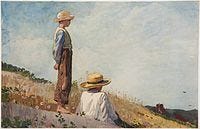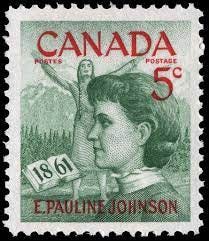Just a Boy
Canadian poet E Pauline Johnson's portrait of a young settler in the early 20th century
A meadow brown; across the yonder edge A zigzag fence is ambling; here a wedge Of underbush has cleft its course in twain, Till where beyond it staggers up again; The long, grey rails stretch in a broken line Their ragged length of rough, split forest pine, And in their zigzag tottering have reeled In drunken efforts to enclose the field, Which carries on its breast, September born, A patch of rustling, yellow, Indian corn. Beyond its shrivelled tassels, perched upon The topmost rail, sits Joe, the settler’s son, A little semi-savage boy of nine. Now dozing in the warmth of Nature’s wine, His face the sun has tampered with, and wrought, By heated kisses, mischief, and has brought Some vagrant freckles, while from here and there A few wild locks of vagabond brown hair Escape the old straw hat the sun looks through, And blinks to meet his Irish eyes of blue. Barefooted, innocent of coat or vest, His grey checked shirt unbuttoned at his chest, Both hardy hands within their usual nest— His breeches pockets — so, he waits to rest His little fingers, somewhat tired and worn, That all day long were husking Indian corn. His drowsy lids snap at some trivial sound, With lazy yawns he slips towards the ground, Then with an idle whistle lifts his load And shambles home along the country road That stretches on fringed out with stumps and weeds, And finally unto the backwoods leads, Where forests wait with giant trunk and bough The axe of pioneer, the settler’s plough.
What we love about this poem…
At first glance, it seems to be a neutral depiction of a young boy resting on his way home on a hot summer’s day, somewhere out in the Canadian west, judging by the clues in the poem—‘Indian corn,’ the baking sun, the straw hat, ‘country road,’ and ‘backwoods.’
But something much more ominous is building here, borne out by the words ‘pioneer’ and ‘settler’s plough’ in the final line. The Indigenous woman poet describes the nine-year-old Irish settler boy as ‘innocent’ yet ‘semi-savage’. In this encounter, Johnson turns the conventional idea of savagery on its head, applying it to Europeans––and coolly captures a young colonialist in the making. Little Joe rests from his hard work of husking corn in a landscape that’s already been changed by his presence: the fences on the fields forming crazy zig-zag patterns, the mighty trees being felled to make way for the plough.
The poem’s subtitle is ‘An Etching’, which suggests it’s like a work of visual art, as if we’re seeing the boy in front of us rather than reading about him and summoning his image in our minds. We love the way the Winslow Homer watercolour we’ve chosen to go with the poem captures what Joe might have looked like.
About the Author
E Pauline Johnson (1861-1913) was a Canadian writer whose father was a hereditary Mohawk chief and whose mother was English settler. Known for her poetry and stage performances (under the Mohawk name Tekahionwake, which means ‘double life’), Johnson played a key role in the formation of Canadian literature at the turn of last century.
Suggest a LitHit!
Tell us your own favourites from literature you've read, and we can feature you as a Guest Curator if you like. Just email us with the following information:
Your full name
The title of the book you're suggesting
The location of the excerpt within the book (e.g., "in the middle of chapter 5"), or the excerpt itself copied into the email or attached to it (in Word)
Why you love it, in just a few sentences
About LitHits
LitHits is a project of the Faculty of English at the University of Oxford. It helps you make time for reading by bringing you unabridged excerpts from brilliant literature that you can read on the go, anytime or any place. Our curators carefully select and frame each excerpt so that you can dive right in. We are more than a book recommendation site: we connect you with a powerful, enduring piece of literature, served directly to your mobile phone, tablet or computer.
You might also enjoy...
Feedback
We'd love to hear your thoughts on our newsletter:
kshepherdb@yahoo.co.uk
Graphic design by Sara Azmy
All curation content © 2023 LitHits. All rights reserved.




